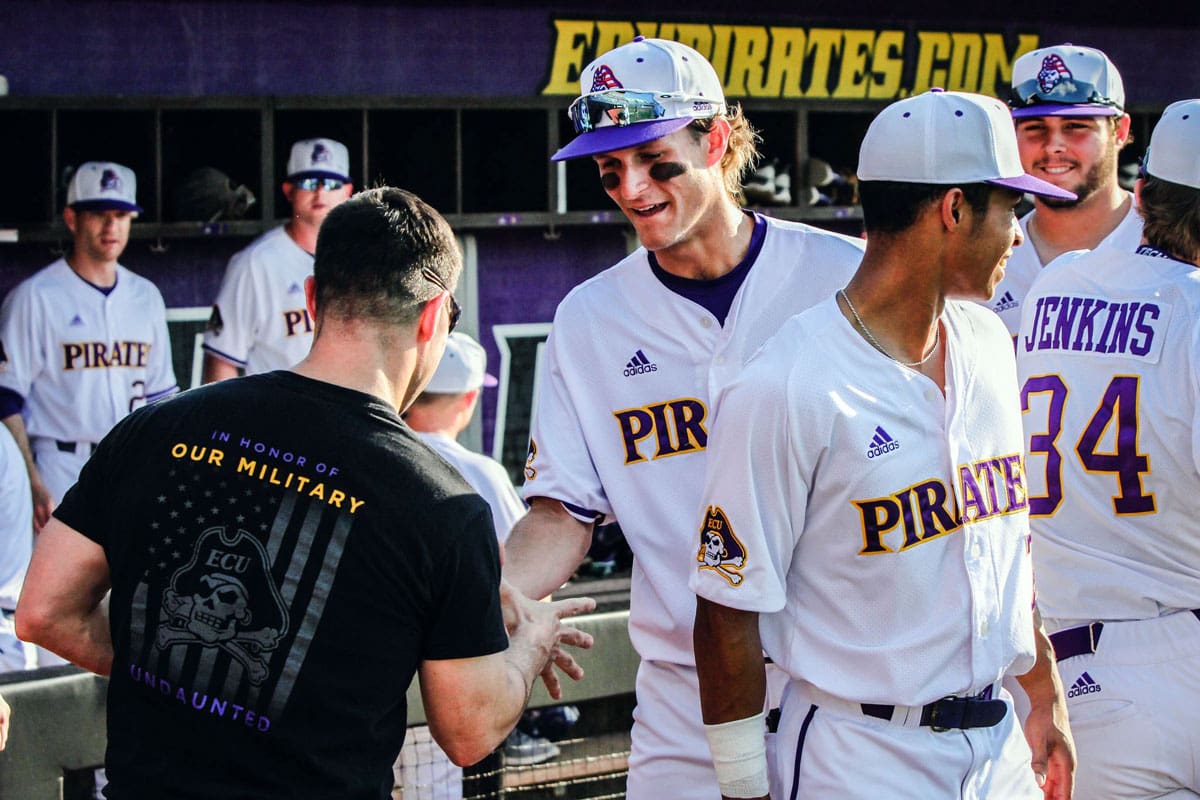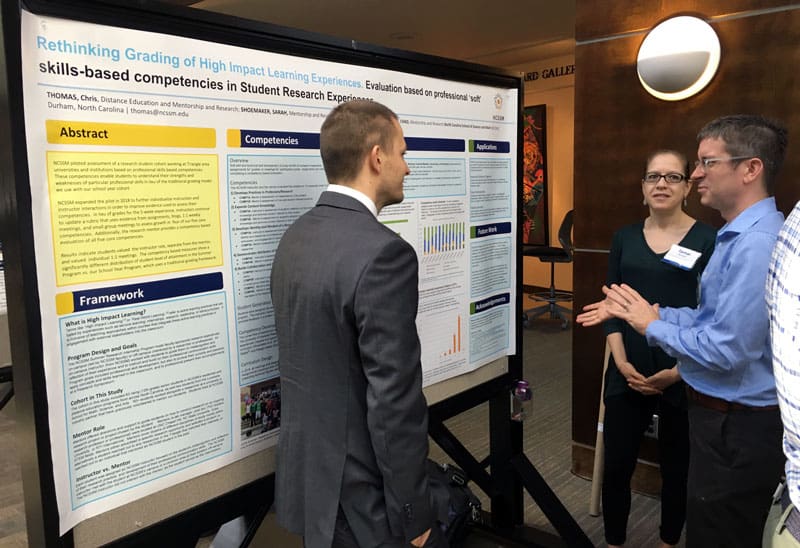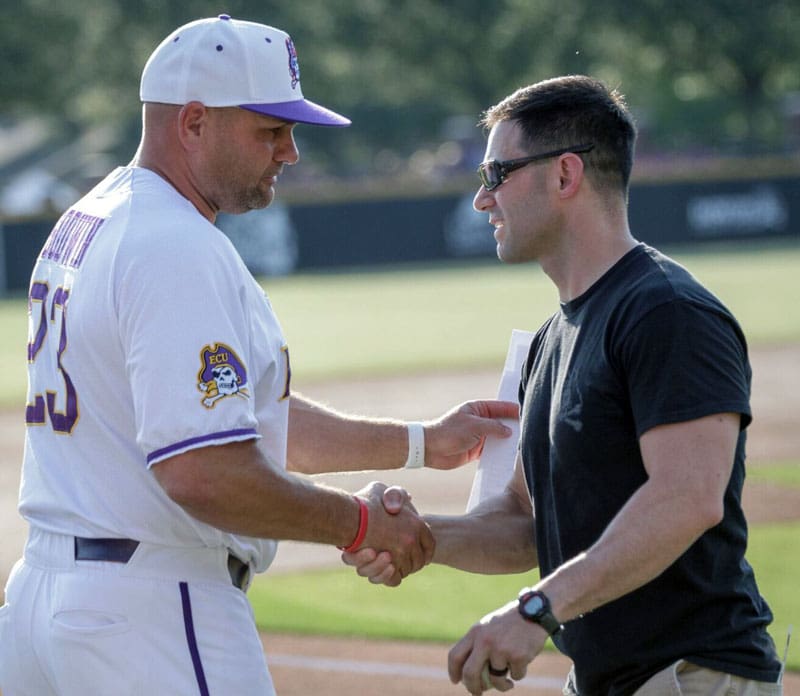
Conference Highlights How Student Success is a Team Effort
Last year, East Carolina University invited Isaiah Ybarra to throw out the first pitch for the Pirates’ “Salute to Service” baseball series. After having served ten years as a fixed wing crew chief in the United States Marines, Ybarra had returned home to major in history education.
This anecdote is worth recalling not because baseball season looms before us, but because Ybarra’s story epitomizes the work being done across the UNC System to promote student success. This work will ensure that more students, from more diverse backgrounds and with unique life experiences, graduate on time and with good grades.
Ybarra hasn’t just enrolled at ECU. A university-sponsored student success initiative has made him part of the ECU team in more ways than one. This sense of belonging has extended well beyond Ybarra’s brief moment on the pitcher’s mound. Thanks to ECU’s innovative Student Veterans’ Resource Alliance (SVRA), he has been absorbed into a student veterans support and professional networking community. At the UNC System’s second annual Student Success Conference, representatives from ECU shared the lessons they learned from the process of establishing the SVRA.

On February 7, 2019, more than 200 attendees, representing all 17 UNC System institutions, convened at the William and Ida Friday Center for Continuing Education in Chapel Hill, NC to exchange innovative strategies for supporting students. As one would expect at a conference dedicated to improving student success, many of the presenters and informative poster kiosks discussed cutting edge teaching strategies. But other panelists made it clear that student success depends on much more than what happens in the classroom.
Student success also requires universities to help students from diverse backgrounds to navigate the challenges of student life. Universities must help them to pick the right courses and to develop strategies for rebounding from poor grades.
Student success, in other words, isn’t just the result of good teaching. It is also the result of institution- and System-wide support mechanisms.
Institutions as Learning Communities
Several conference panels emphasized the powerful impact universities can have when they pursue initiatives that promote the university as a supportive learning community.
The University of North Carolina School of the Arts is experimenting with new, high-impact strategies for establishing this sense of community during students’ first year in school, when their patterns of interactions with faculty and peers are established. Statistics show that these early interactions have a dramatic impact on students’ future success.
UNC Greensboro is studying the effectiveness of its support efforts for special populations, including first generation, low income, and students with disabilities.

ECU’s Student Veterans’ Resource Alliance specifically reaches out to veterans in the college of education. Its goal is to leverage the intense sense of connection students might feel when they share both past military experience and future professional goals. By fostering the sense of community among student veterans, ECU provides a forum where they can help one another develop the academic, psychological, and emotional skill sets that contribute to student success.
More than that, the student community, built around shared career aspirations, is generating a rapidly expanding professional network that will lead to success beyond the classroom.
Military veterans return home with training and life experiences that naturally make them strong leaders. The SVRA capitalizes on these strengths, encouraging and helping veterans to bring these leadership skills into community schools.
“Our motto is, ‘I’ve defended democracy abroad, now I defend it here. I teach,’” said Dr. Allen Guidry, assistant dean of Planning and Global Engagement at ECU.
When Students Struggle: Innovative Intervention Strategies
Sometimes student success depends upon institutions taking more aggressive steps to get students on the right track and to make sure they stay the course.
Several panelists addressed the importance of using advising sessions as a forum where universities can play a more pro-active role helping students “stage” their academic careers, and where at-risk students can develop strategies for rebounding.
Not too long ago, advising sessions were typically little more than perfunctory encounters, where hurried faculty members casually signed off on students’ degree requirement plans. Students and faculty alike were doing little more than ticking boxes.
“Advising should be more than transactional,” said John Smail, associate provost for undergraduate education at UNC Charlotte.
Indeed, today, advisors regularly help students set academic and professional goals. More importantly, these conference sessions made it clear that UNC System institutions are innovating new ways of using advisors to perform academic triage, helping at-risk students recover from a potentially disruptive academic performance.
Other sessions addressed ways to support unique “at risk” populations: “partway home” students who are a few hours shy of degree completion but who have failed to enroll for two or more semesters; students facing academic probation for the first time; and “stop out” students who withdraw temporarily from the university.
Empty Wallet, Empty Classroom: Working Around Financial Roadblocks
Of course, innovation in teaching, advising, and campus support mean little to the student who can’t afford to stay enrolled. The UNC System offers some of the most affordable tuition rates in the nation, but sometimes students run into unforeseen troubles that can stifle degree progress.
Promoting student success also requires mechanisms that can help students facing financial challenges. Economic hardship shouldn’t prevent talented scholars from completing their studies.
Presenters from NC State focused on how food and housing insecurity can impact student success and how the university has mobilized forces from across campus to provide support to those students unsure of their capacity for securing their next meal or shelter for the night.
Presenters from UNC Greensboro and Western Carolina University discussed the logistics of providing financial aid incentives to encourage students who have fallen behind to use summer school coursework to get back on track.

Winning Strategies
Isaiah Ybarra’s opening pitch for the ECU Pirates captures the guiding philosophy behind the 2019 Student Success Conference: student success is a team effort.
The convening made it clear that the UNC System is working diligently to ensure that learning is no longer a solitary pursuit.
Students proceed across the graduation platform individually, but no one gets there alone. Student peers, teachers, advisors, financial aid officers–all lend a hand, and the 2019 Student Success Conference was aimed at magnifying the impact a single gesture of assistance can have.
UNC System Senior Vice President for Strategy and Policy Andrew Kelly made it clear that “the Strategic Plan’s emphasis on student success is already paying off. We’ve raised our five-year graduation rates by 5.5 percentage points since 2013 to surpass 70 percent, fully 8 percentage points ahead of the national average. We’re enrolling and graduating more transfer students from the community colleges. And we’re helping low-income students and those from Tier 1 and Tier 2 counties succeed.”
As presenters talked about what strategies have worked at their home institutions, the lightbulbs going off in attendees’ heads were obvious. Over the course of a day, grand ambitions to adopt and adapt the best ideas were hatched.
In and of themselves, the individual initiatives were pretty remarkable. When they are scaled up across the UNC System, they might just well be extraordinary.